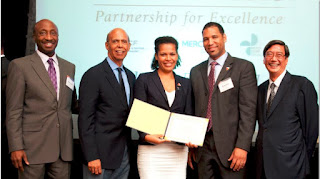 |
| Mitchell Harris |
When I started at the College of Staten Island in the spring semester of 2012, I knew that if I wanted to meet new people I
needed to get involved with a club on campus. On the first day of the
semester, I walked around the campus center to learn about the clubs
and opportunities that C.S.I. had to offer. Since I have been raised in a
Jewish household within a Jewish community and had gone to Jewish private
schools until this point of my life, I felt comfortable walking into the Multi-Faith Center, especially because I noticed a big blue and white sign on
the window that had “Hillel” written on it. Hillel is an organization and
club that promotes Jewish life on campus.
From the moment I walked into the office the director, Amy Posner, made me feel very welcomed and comfortable. After that day, I went to almost every event the club put together and became very involved. The first event I went to was a tabling fundraiser, around Valentine’s Day, for “Save a Child’s Heart Foundation, " during which we sold hearts on glass as well as pink and red cupcakes. Another event that I went to was a showing of a movie called The Syrian Bride. This movie portrayed some of the difficulties of arranged marriages and afterwards there was a group discussion. After I attended multiple events and spent a great deal of time in the Multi-Faith Center, Amy Posner asked me if I was interested in interning for her as a P.N.E.I., which stands for Peer Network Engagement Intern. At first I was hesitant to accept, but after I let the idea sink in I realized what a great opportunity and learning experience it would be. The application process for this internship was straightforward; I needed to fill out some basic information about myself and then I wrote a required essay from three choices of prompts. I chose to write about a time that I reached out and built a relationship with someone new.
One of the requirements to become a P.N.E.I. was to attend a five-day conference over the summer at Washington University in St. Louis, Missouri. At the conference the objective of the internship was explained, but Amy Posner had scheduled a couple of meetings before the trip to prepare me so I already knew the purpose. The primary goal of being a P.N.E.I. is to build relationships and form new networks. The secondary goal is to then have these new relationships attend Hillel events and make the new networks connect with a bigger one. To help with this goal, the organization gives me money to create my own events and capture the interest of students in a way that I feel would be successful. At the conference, which had hundreds of college students involved with Hillel from around the world, there were many events, including lectures on how to approach or interact with people and discussions on how to organize events along with two-college interaction simulations. In the simulations, each person was given a different role to play and had to accomplish specific goals within a given amount of time.
At the conference, the event that I found to be most meaningful and beneficial was called “Be Interested, Not Interesting." From this group exercise, I learned that in certain situations, such as the ones I will be in for this internship, it is more important to show interest in my college peers by asking them more about themselves than it is to let them know about myself. However, this does not mean that I should interrogate everyone that I meet, but rather the conversation should be focused more on them. I was also reminded the importance of being a good listener. Not only is it good to listen, but it is important to listen without interrupting someone while they are still expressing their thought, idea or input. This is especially important when something is being said that is a shared experience that may cause an urge to express approval or similarity right away. In addition to the program itself, I learned more by just interacting with the hundreds of people that were at the conference than anything else. I find that there are many things in life that can be taught, but ultimately the experience is what contributes to education; of course the training is crucial as well.
My goal as an intern is to interact with as many students as possible and try to have events that are educational in an enjoyable way. One of the events that I plan on organizing this year is a trip to Dialog In The Dark in NYC. In Dialog in the Dark, visitors are led through a series of New York City environments by blind and visually-impaired guides in complete darkness. I visited a museum like this in Israel a few years ago and remember how it was such an incredible way to learn appreciation for eyesight.
If anyone is interested in learning more about Hillel Club please feel free to contact me at MitchellDeanHarris@gmail.com. I'll be more than happy to answer your questions to the best of my ability. Additionally, anyone is always welcome to stop by the Multi-Faith Center in 1C-202.
.jpg)


